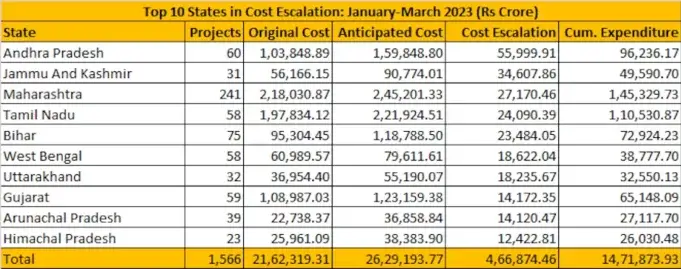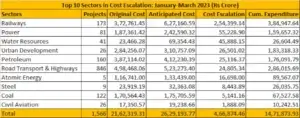The Quarterly Project Implementation Status Report (QPISR) on Central Sector Projects (costing Rs 150 crore and above) for the 4th quarter of 2022-23 (January-March 2023), contains detailed information on 1,566 projects covering 443 mega projects (each costing Rs 1000 crore and above) and 1,123 major projects (each costing Rs 150 crore and above but below Rs 1,000 crore). The anticipated completion cost of these 1,566 projects is reported to be Rs 26,29,193.77 crore. The total expenditure as on 31st March 2023 was Rs 14,71,873.93 crore which works out to 55.98 percent of the total anticipated completion cost and 68.06 percent of the original cost. For these 1,566 projects, a total outlay of Rs 2,81,251.99 crore has been allocated for 2022-23.
Out of 1,566 projects, 12 projects were ahead of schedule, 292 projects were on schedule, 931 projects were delayed with respect to the original schedule of completion. Further, for 331 projects, either the original or the anticipated date of completion was not reported.
Out of 1,566 projects, 384 projects were having cost overruns of Rs 4,66,874.46 crore which is 21.59 percent of their sanctioned cost. However, with regard to the latest approved cost, 285 projects had reported cost overruns of Rs 1,97,069.19 crore. Further, it is noted that 259 projects are facing both time and cost overruns.
The percentage of delayed projects had changed from 41.27 percent in the quarter ending March 2022 to 59.45 percent in the quarter ending March 2023. Similarly, the percentage of Cost Overrun had changed from 21.43 percent in the quarter ending March 2022 to 21.59 percent in the quarter ending March 2023.
Factors Responsible for Time and Cost Overruns
The brief reasons for time and cost overruns as reported by various project implementing agencies are delay in land acquisition, forest clearance, fund constraints, rehabilitation & resettlement problems of project-affected persons, delay in the supply of equipment, slow progress in works other than civil works, contractual issues, delays in equipment erection, changes in structural design, geological surprises, transfer of technology, change in scope of work, delay in shifting of utility by State Government, change of ownership of executing agency, delay in award of works, ROU/ROW problems, adverse law & order situation and COVID-19, etc.












